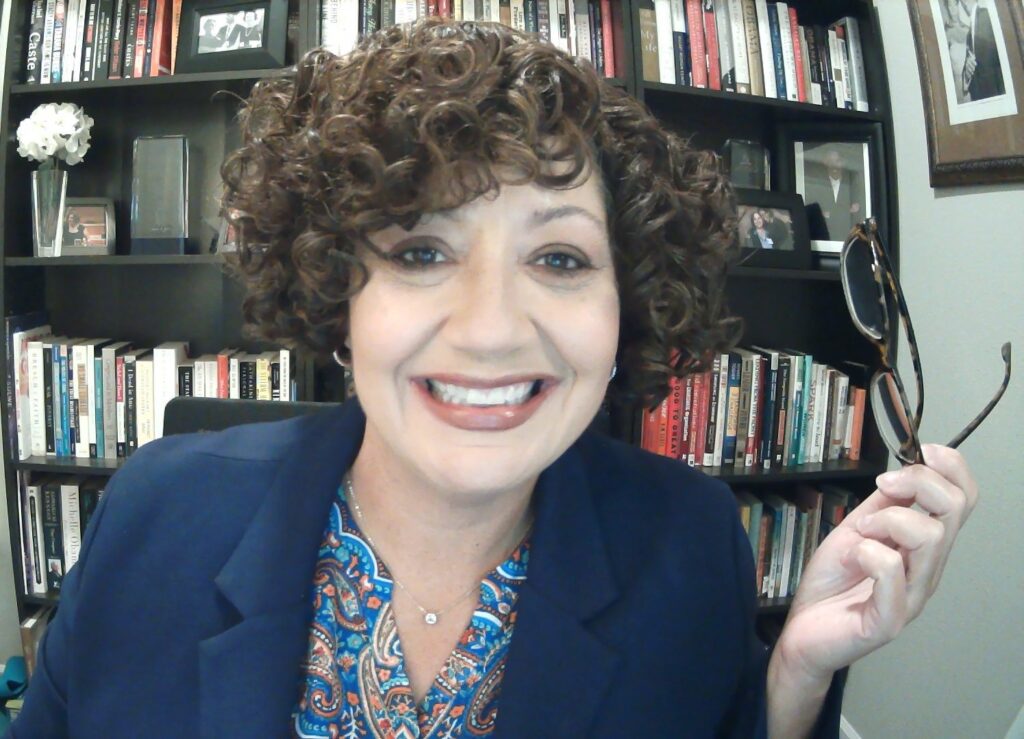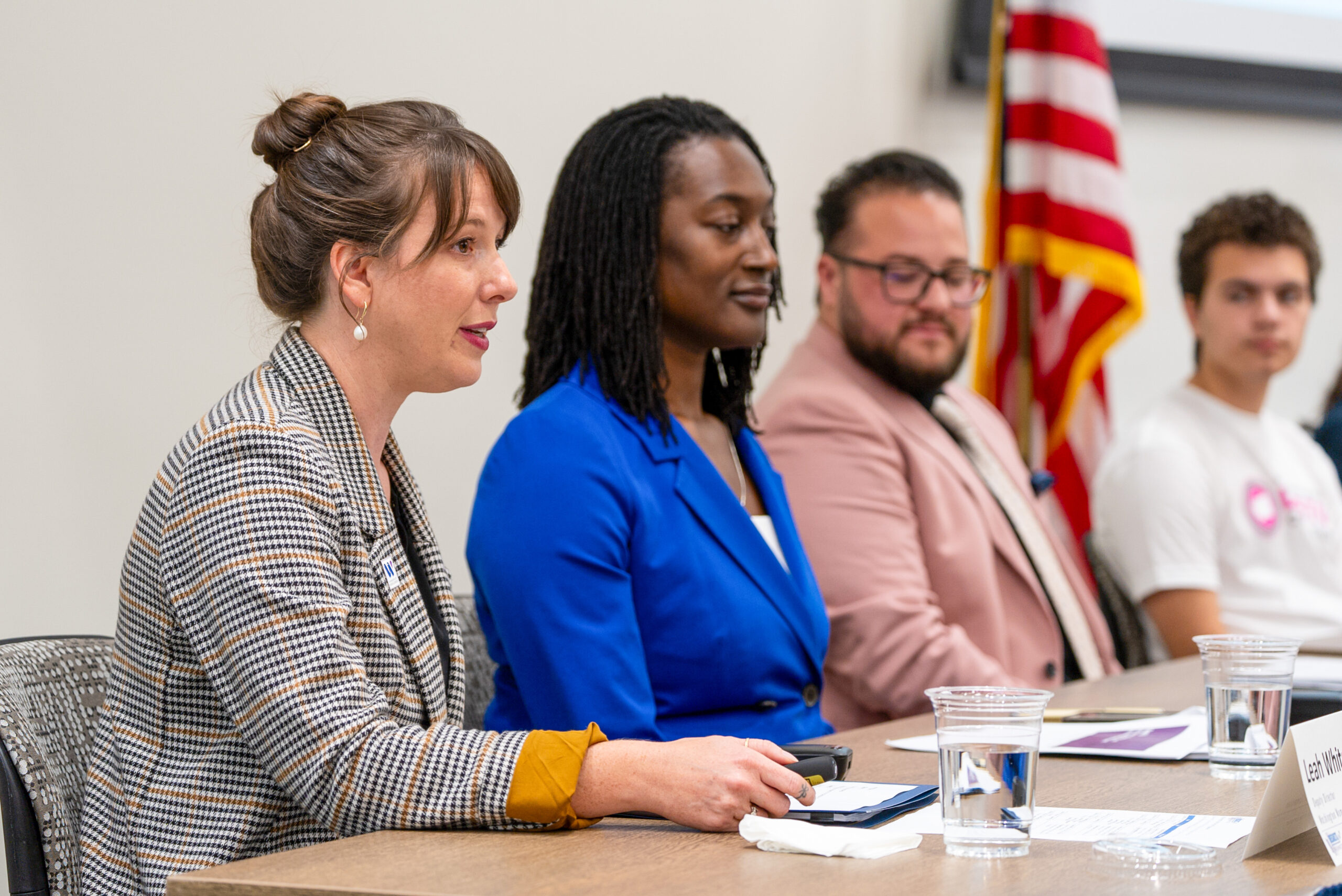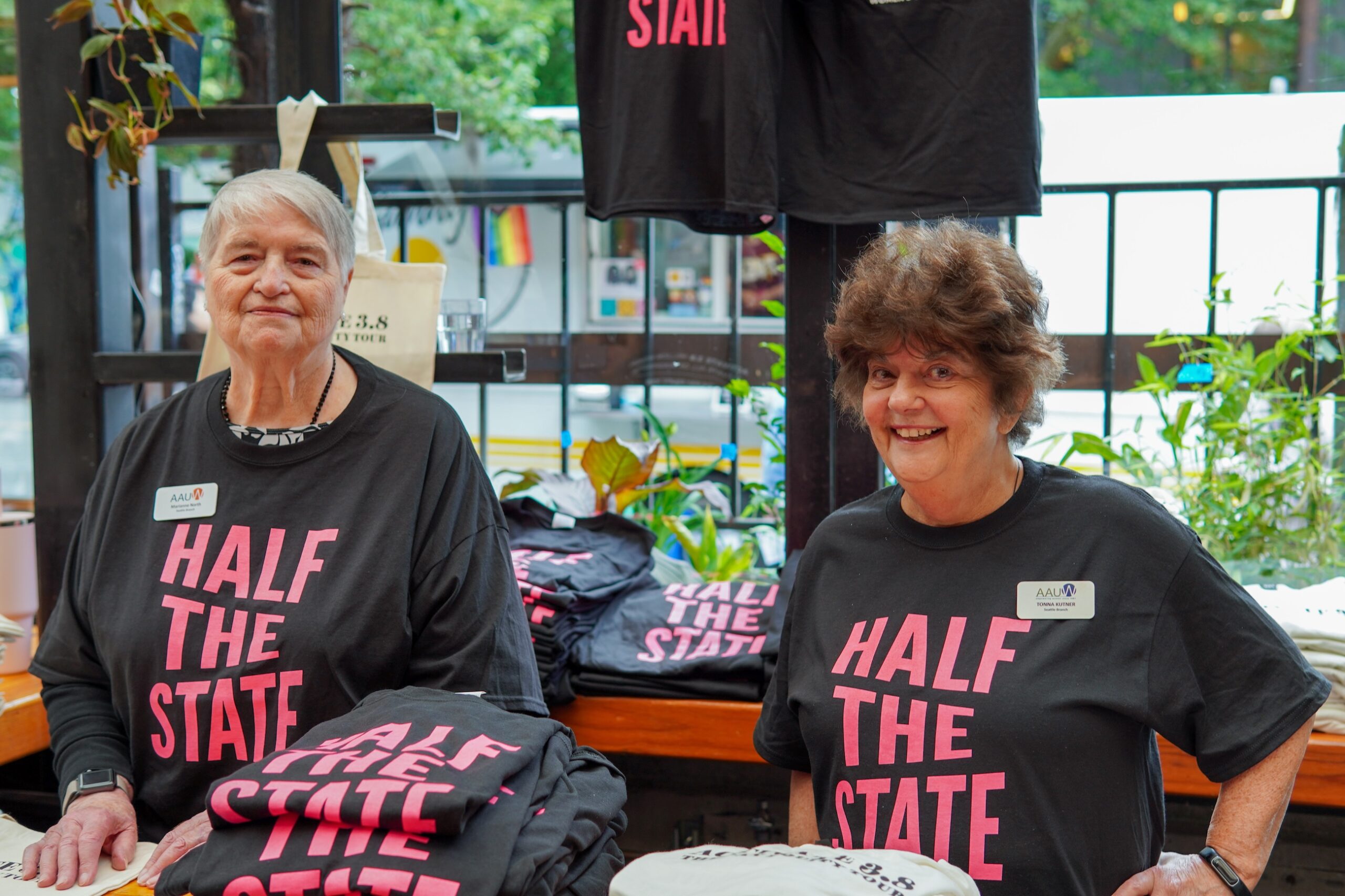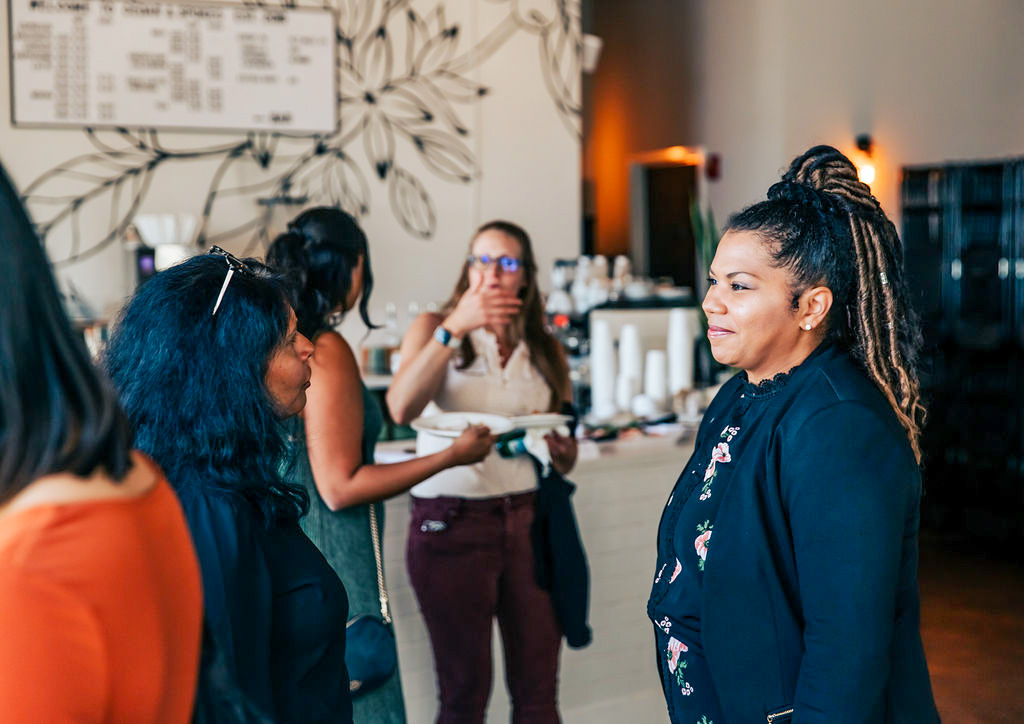An Interview with Regina Malveaux, Director of the Washington State Women’s Commission
November 20, 2021
This month, to continue our monthly highlight of women in leadership in Washington State, the Commission sat down for an interview with the Commission Director, Regina Malveaux. Regina was appointed the Director of the Washington State Women’s Commission in August 2020. She was a member of the first cohort of Commissioners, appointed shortly after the Commission’s formation in 2018.
Regina has had extensive experience in nonprofit social service and advocacy, with a national reputation as champion on issues related to gender-based violence. Prior to her role as the Commission’s Director, Regina served as the CEO of YWCA Spokane, where she facilitated legal, mental health, domestic violence protection and family services for women and families. In that role, she collaborated with the Spokane Mayor’s office to form the Spokane Family Justice Center and worked with the Washington State Legislature to secure funding to support the project.
In her work with at the YWCA, she worked with congressional leaders such as Senator Patty Murray, House Speaker Nancy Pelosi, and helped launch the national campaign to reauthorize the Violence Against Women Act (VAWA) in 2019. She has also been active in state policymaking, including work to pass gun violence prevention policies such as initiatives for universal background checks and legislation for victim protection, extreme risk protection orders and victim notification.
Regina sat down to share her personal and professional journey, and share insights on her guiding principles, support network, and current work to create cultural and systemic change towards gender equity.

Can you tell us a few formative professional experiences and relationships that led you to your role today?
RM: Absolutely, and thank you so much for asking. The notion of lifting others as we climb is so important and I’m always grateful for the opportunity to acknowledge and thank a few of the many role models and mentors who not only influenced my career path but helped open doors to make it possible.
In my mid-twenties, I was a divorced single mom with an infant and a toddler struggling to maintain hope (and a home) after an abusive marriage prompted not only the loss of a job, income and stability, but also the loss of my confidence and sense of self.
As a survivor of domestic violence who had become somewhat isolated from my own support system, I found myself too ashamed to ask for help, and ultimately turned to our social safety net systems for temporary assistance. The level of indignity that I experienced and watched others experience prompted me to change my academic major from business to social work and social policy, where I began to study issues of poverty, economic inequality and social justice. This work led me to meet three women who would ultimately serve as catalytic role models and mentors.
The first, Marian Wright Edelman, was President and Founder of The Children’s Defense Fund (CDF), an advocacy organization based in Washington DC whose mission is to ensure that no child in our nation is left behind. The CDF champions policies and programs to end child poverty and give every child a healthy and safe start in life including quality early childhood education, a level educational playing field, and safe families and communities free from gun violence. They had a special emphasis on women and children living in poverty and children involved in the child welfare and juvenile justice systems. Meeting Mrs. Edelman during a time in my life where my own small family was experiencing many of the issues she championed really helped inform my decision to pursue a career in policy advocacy and social service supports for women and children in need.
As an intern and organizer for the Stand for Children advocacy group, I also met Sharon Kalemkiarian, a local lawyer and child advocate in San Diego who helped guide my career path and opened early doors for me in the political arena. Another key mentor was Dr. Shirley Weber a well respected community leader in our Black community and tenacious advocate for equity and justice. Both saw something in me that prompted them to encourage, support and provide me with opportunities to lead. I’m exceptionally grateful for them both. A few years ago I had the opportunity to give a speech to the local bar association and acknowledge and thank both Judge Kalemkiarian and California Secretary of State Weber. It was a pretty remarkable moment.
Who inspired you to be a leader and why?
RM: During the civil rights movement, Marian Wright Edelman saw the desperate plight of poor children and families in the South, particularly Black families. At the time, there was also a critical need for Black lawyers to fight the injustices of the Jim Crow South. Mrs. Edelman was the first Black woman admitted to the Mississippi Bar Association. When I asked her how and why she had decided to move to a state she had no existing relationship with to do the dangerous work of serving as a civil rights lawyer in the 1960’s, she simply said “I had the skills and that’s where I was needed.”
After meeting Mrs. Edelman and completing my undergraduate degree in social policy, I pursued a law degree at Howard University School of Law after being drawn to its rich social justice legacy and its location in our nation’s capitol. My time in DC gave me the opportunity to work not only with Mrs. Edelman, but to intern for then First Lady Hillary Clinton and Congresswoman Maxine Waters, then Chair of the Congressional Black Caucus.
Having the opportunity to see how power worked (or often didn’t) on behalf of those individuals and communities with the greatest need made clear the need for more voices in the halls of Congress and in state houses who cared about our most marginalized. I decided I would be one of those voices.
I vested much of my own career in the YWCA, whose mission is eliminating racism and empowering woman while providing critical services for victims and their children and serving as a voice with policy makers about issues of social and economic justice. While I started my career with the YWCA San Diego, in my hometown of San Diego, I would later move to Norfolk, Virginia and Spokane, Washington to lead YWCAs in those communities. Like Mrs. Edelman, I had no prior connection to either place but I saw good organizations doing important work for women and children in their communities and knew that my skills could help have additional impact.
How have your experiences as a Black woman, a mother, and a survivor shaped your approach to the work that you’ve done, that you currently do, and your leadership?
RM: My own lived experience as a young single mother struggling to support two young children while simultaneously working, going to school and trying to make sure their needs were met and that they were safe directly speaks to the passion and tenacity that I bring to my work. Also, as the mother of a young Black man I know at a visceral level the fear and urgency for change that so many have called for during the racial reconning of the last year in particular.
What is your ‘why’?
RM: Helping to dismantle barriers and change systems to create equity in opportunity and access to resources is my why. Helping young women find their own personal power and helping create opportunities for them to build the lives they deserve is my why. Doing what I can to ensure children of color have every opportunity that any other child in our state and our nation has. Those are my whys.
What does leadership mean to you, and what’s your leadership style?
RM: For me, leadership has most often been ‘doing the thing that needs to be done that no one else has stepped up to do.’ Early in my career, that was often through informal or volunteer roles as a community organizer and parent advocate at school board meetings or the state legislature, to speak as someone with lived experience on the plight of low-income families struggling to meet their basic needs.
In my more formal leadership roles, leadership has often meant pushing myself, my boards and my teams to stand firmly in our mission and challenge the status quo, even if we risked alienating donors or others. If my father were still living he would say about my leadership: “That girl’s leadership style is hard-headed. She does not take no for an answer.” And I would agree with that assessment.
How do we move forward when everyone is telling us that our idea won’t work?
RM: We just do. If you have a vision that is grounded in your core values and it is an issue that needs to change, you just keep at it. You won’t always succeed, but you must always try. And the reward of seeing your idea make a real difference for the people that you are working on behalf of is worth any failures that you encounter along the way. That’s not to say failures don’t sting, but failure is not fatal.
What has been the most significant barrier in your career? How did you overcome it?
RM: Early in my executive journey, I had an almost compulsive need to be liked by those who worked with and for me. Despite knowing the right solution for a particular challenge—whether it was budgetary, personnel or policy related—I too often failed to trust my own analysis or instincts, and spent too much time concerned about what people would think of my decisions.
It is absolutely important to surround yourself with smart people with a shared commitment to your mission, and just as important to solicit their insights and expertise. But at the end of the day, if you are the leader, it is incumbent upon you to remind yourself you have not only a right, but an obligation, to stand in your power and have confidence in your own decision-making ability.
A couple of years ago I had the opportunity to hear Valerie Jarrett, former senior advisor to President Barack Obama, speak at a conference. She said, “I know many strong, smart women who are leaders in their organizations. They hold power, but often give it away while trying to be ‘too nice’. You’re a leader. You’ve earned your seat at the table. Don’t give away your power.”
What are the ways you stay grounded and take care of yourself?
RM: There is a wonderful Maya Angelou quote that I try to live by, in which she says: “The best part of life is not just surviving, but thriving with passion and compassion and humor and style and generosity and kindness.”
I try not to take myself too seriously. I laugh a lot. I make an effort to stay connected to my family and close friends that I’ve made over different stages of life. Your childhood friends and those who have seen you in the more challenging seasons of your life are really a gift. They know and love you for who you are, and can oftentimes remind you who you are when a moment or circumstance causes you to question yourself. They really are the thing that have kept me grounded and they are the ones who remind me to slow down and take care of myself when they see that I’m not.
My daughter is a massage therapist and holistic health practitioner. I’m also working to do a better job of following her example. It’s definitely a work in progress.
What are some of the key issues and priorities that your agency is tackling right now?
RM: Our purpose at the Washington State Women’s Commission is to improve the life of every woman and girl in our state by ensuring equitable opportunities and removing systemic barriers through engagement, advocacy, and public policy, while being inclusive of our diverse populations. Our vision: A Washington where every woman and girl is healthy, safe, prosperous, and empowered to achieve their full potential.
Currently our primary focus is aiding women’s overall recovery from the impacts of COVID-19 which disproportionately affected women and girls at all ages but particularly impacted women of color.
I encourage those interested in learning more about our work and the status of women and girls in our state to view our biennial report published earlier this year.
How can women support other women in their organizations?
RM: I think too often we are all so busy attending to the tasks and deadlines involved in our work, that we don’t always take the time to actually just stop and say, “How are you?” and mean it. This is certainly something I have been guilty of throughout my life. Focusing on the next thing that needed to be done, solving for ‘the tyranny of the urgent’ or focusing on the next achievement that needed to be checked off the list, not always prioritizing taking the time to really find out how those around me were doing.
When I started genuinely investing time in understanding the needs, journeys and challenges that other women in my sphere of influence were facing it allowed me to serve as a friend, resource, cheerleader or sponsor in a way that hopefully means I am paying forward the investment that others have made in me over the years.



